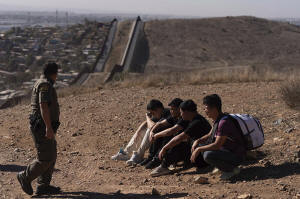Asylum-seekers pushed to new extremes in Mexico after Trump's border
crackdown begins
 Send a link to a friend
Send a link to a friend
 [January 24, 2025]
By MEGAN JANETSKY and EDGAR H. CLEMENTE [January 24, 2025]
By MEGAN JANETSKY and EDGAR H. CLEMENTE
ATOTONILCO DE TULA, Mexico (AP) — When Dayana Castro heard that the U.S.
asylum appointment she waited over a year for was canceled in an
instant, she had no doubt: She was heading north any way she could.
The 25-year-old migrant, her husband and their 4- and 7-year-old
children had nothing left at home in Venezuela. They already had trekked
the perilous Darien Gap jungle dividing Colombia and Panama and criminal
groups that prey on migrants like them.
Castro was one of tens of thousands of migrants across Mexico with
appointments to apply for U.S. asylum at the border scheduled out
through February until President Donald Trump took office and issued a
series of executive orders to beef up border security and slash
migration. One ended the use of the CBP One app that had allowed nearly
1 million people, many seeking asylum, to legally enter the U.S. since
January 2023.
“We’re going to keep going. We can’t go home after all we’ve been
through, after all the countries we’ve fought our way through, only to
give up now,” she said from a small shelter in central Mexico beside a
freight train line they were riding north.
Now, migrants like her are adjusting to a new and uncertain reality.
Many remain determined to reach the U.S. through more dangerous means,
riding freight trains, hiring smugglers and dodging authorities. Some
lined up in Mexico's refugee offices to seek asylum in that country,
while others contemplated finding a way back home.

Trump on Monday declared a national emergency at the U.S.-Mexico border
and announced plans to send U.S. troops and restrict refugees and
asylum, saying he wants to halt illegal entry and border crime. The
measures follow a drop in illegal crossings in recent months.
Supporters of the CBP One app that people like Castro used to try to
enter legally say it brought order to a chaotic border. Critics say it
was magnet for more people to come.
Adam Isacson, defense oversight analyst for the human rights
organization Washington Office on Latin America, said Trump's crackdown
on illegal immigration will surely deter migrants in the short term but
will also have cascading humanitarian consequences.
People with valid asylum claims may die in their own countries, he said,
while migrants fleeing countries like Venezuela, Cuba and Haiti who
cannot easily return home may end up floating around the Americas
“completely unprotected." Isacson and other analysts expect Trump's
policies will lead to increased demand for smugglers and push migrants —
many of whom are children and families — to more dangerous terrain to
avoid capture.
By Tuesday, Castro was wrapping her mind around the fact that continuing
on after her Feb. 18 appointment with U.S. authorities was canceled
would likely mean putting her life, and the lives of her family, at risk
as cartels are increasingly extorting and kidnapping vulnerable
migrants.
[to top of second column]
|

Border Patrol Agent Gutierrez walks past four men detained after
crossing the border illegally in a gap in two walls separating
Mexico from the United States before turning themselves in,
Thursday, Jan. 23, 2025, in San Diego. (AP Photo/Gregory Bull)

“There’s the train, the cartels, migration police, and they all make
you pay them,” she said as she fed her children bread beside a small
shelter where they slept. “But if we don’t put ourselves at risk,
we’ll never arrive.”
Along Mexico's southern border with Guatemala another group of
migrants in Tapachula took a different approach.
Cuban migrant Rosalí Martínez waited in line outside the Mexican
Commission for Refugee Aid in the sweltering southern city.
Traveling with her child, she had hoped to reunite with her husband
in the U.S.
Now, she was biding her time, joining an increasing number of
migrants who have sought asylum in Mexico in recent years, either
temporarily due to shifting American restrictions or more
permanently.
Like many Cubans in recent years, Martínez was fleeing a spiraling
economic crisis.
“I’m going to stay here and see what happens,” she said. But “I’m
not going back to Cuba. I’ll become a Mexican citizen, but there’s
no way I’m going back to Cuba.”
Others like 42-year-old Jomaris Figuera and her husband want to
throw in the towel after years trying to build a life outside
Venezuela, where economic and political crises have prompted nearly
8 million people to flee in recent years.
They spent more than four years picking coffee in neighboring
Colombia, but struggling to make ends meet, they decided to traverse
the Darien Gap. They waited nearly a year and a half for a legal
pathway to the U.S. in a wooden shelter in a crime-riddled migrant
camp in the center of Mexico City.
But due to Venezuela's crises, they have no passports. And without
money, they fear their only pathway back will be traveling south
through Mexico and Central America, and walking days through the
same rugged mountains of the Darien Gap.
Anything would be better than staying in Mexico, said Figuera.
“It's like abandoning everything after everything that's happened to
us,” she said. “But after trying to get an appointment, and this
happens, we've given up.”
———
Clemente reported from Tapachula, Mexico. Janetsky reported from
Atotonilco de Tula and Mexico City.
All contents © copyright 2025 Associated Press. All rights reserved
 |